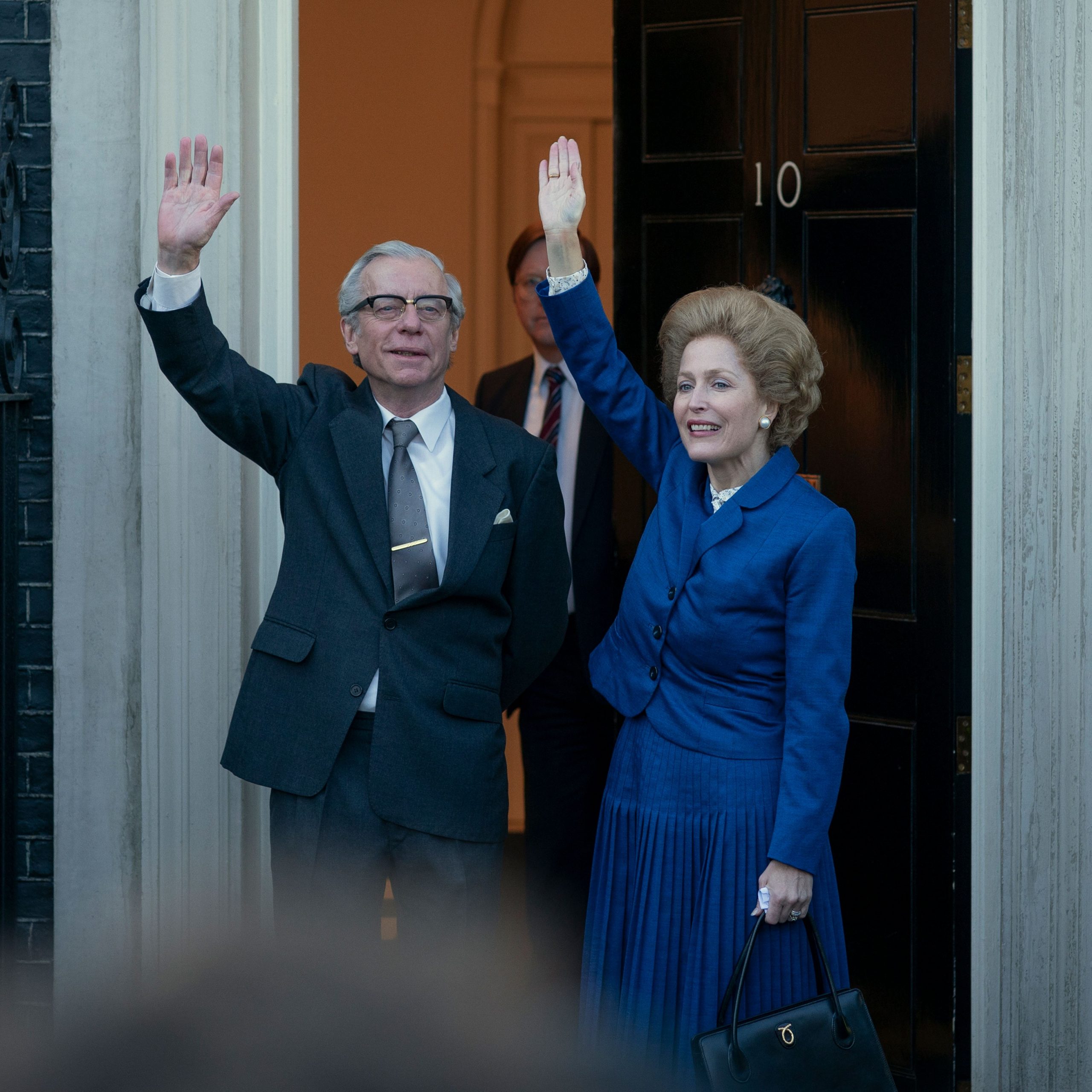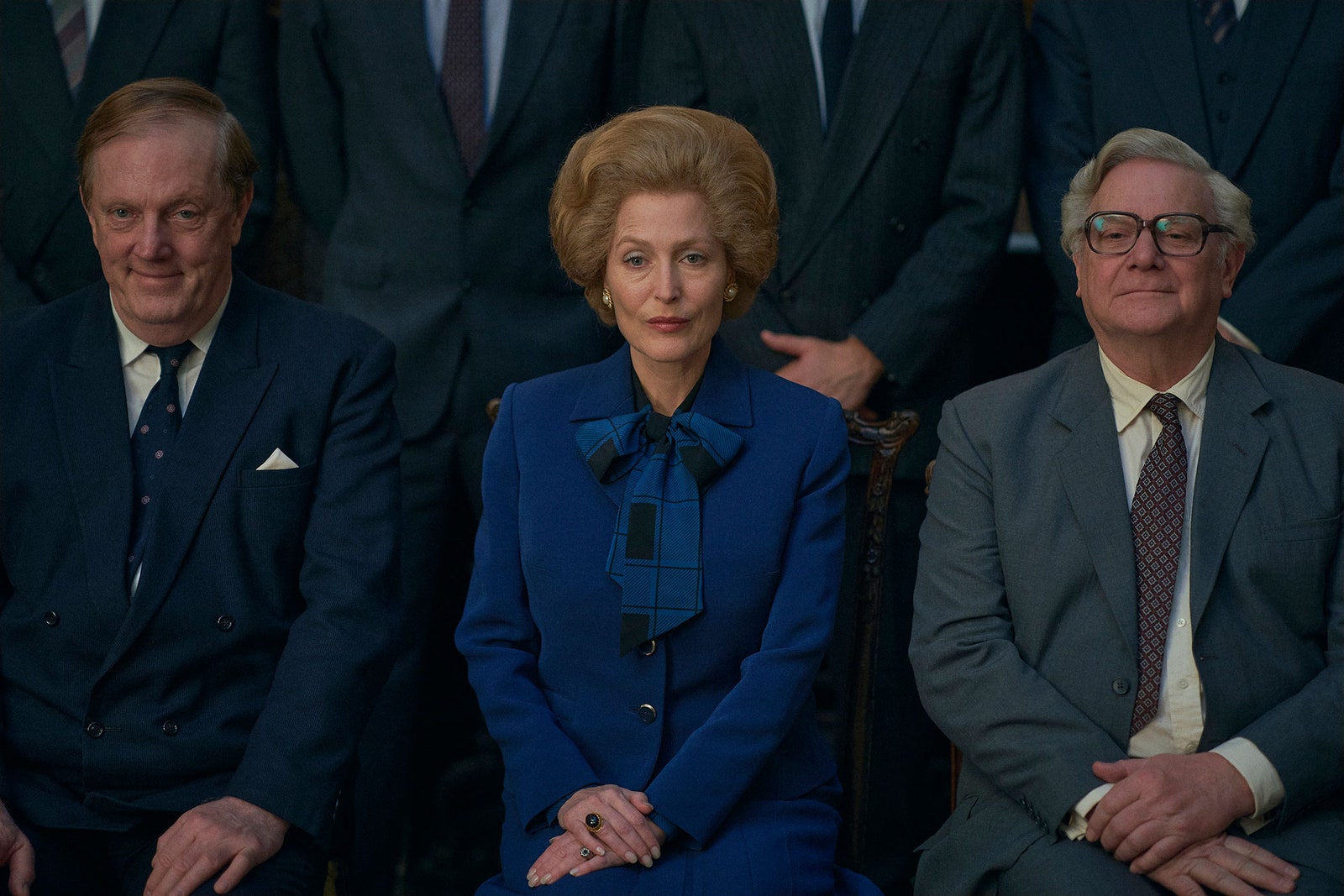Fashion
Gillian Anderson on Playing The Crown’s Iron Lady
On season four of the Netflix hit, the actress takes on the role of a lifetime as British prime minister Margaret Thatcher….


The creations of The Crown’s costume designer, Amy Roberts, also informed Anderson’s transformation. Known for her Aquascutum suits, sensible Asprey handbags, and an immovable bouffant hairstyle, Thatcher’s version of power dressing was a crucial part of her image. Getting the look right involved trial and error on everything from the tailoring to finding accurate makeup for the era. “I was sitting in the hair and makeup chair while they were trying to work out their contributions, and when I would get closer to looking like her, I would take pictures of the mirror because it was like, ‘Oh my God, oh my God. Look, there she is.’” says Anderson. “That was quite a long process. [Finding] the particular blue eyeshadow that felt like it was from the ’70s and ’80s, but it wasn’t quite so opaque, and the particular base that wasn’t too heavy for 4K HD. All of those choices very carefully thought out. So when they would try different versions of things, some looked more like her than others and it was always exciting when we got closer.”
In recent years, actors have disappeared into their roles as famous figures through the use of undetectable prosthetics or CGI magic—think Charlize Theron’s uncanny Meghan Kelly in Bombshell or computerized anti-aging allowed Robert DeNiro to play three decades in the life of gangster, Frank Sheeran in The Irishman. Technology’s helping hand can enhance performance, but Anderson opted to go the old fashioned route. She embodies Thatcher through subtle changes in posture, voice, and movement, a decision she felt appropriate. “We were a similar age, so it didn’t feel like I would need to make myself look older,” says Anderson. “We have a similar nose; we have somewhat similar eyes as we’ve both got hooded eyelids.” Initially, the idea of wearing a dental prosthesis was floated, but it proved distracting. “She had very distinctive teeth. They weren’t great, and she had them capped a couple of times while she was in office,” says Anderson. “Someone built a prosthesis that matched, but it was too much and didn’t look natural at all. We tried different ways of coloring and staining, making a gap, but in the end, we decided against it. [Instead] I figured out a way to hold my mouth so that I had more of an overbite. The mixture of that, the tilted head, and her movements wound up being enough.”
Fashion
Raekwon Unveils “The Emperor’s New Clothes” With All-Star Lineup

Raekwon, a legendary rapper known for his role in the Wu-Tang Clan, has just announced his long-awaited eighth studio album, titled “The Emperor’s New Clothes,” set to be released through Mass Appeal. Although no singles have been shared yet, the album is already creating a buzz and is highly anticipated this summer. It’s been seven years since Raekwon last released a solo album, and this new project feels more like a grand return than just another release.
He’s teamed up with a mix of familiar faces from the Wu-Tang Clan and some fresh talent in hip-hop. Listeners can look forward to clever lyrics and captivating stories filled with raw emotion. Raekwon has invited his Wu-Tang brothers Ghostface Killah, Method Man, and Inspectah Deck to feature on the album, ensuring a classic blend that fans love. He’s also brought in well-respected artists outside of the Wu-Tang family, like Nas and members of the Griselda collective, Westside Gunn, Benny The Butcher, and Conway The Machine, who are known for their gritty style.
Adding to the variety, singers Stacy Barthe and Marsha Ambrosius will provide soulful vocals to complement Raekwon’s hard-hitting verses. The album’s production features talented names like Swizz Beatz, Nottz, J.U.S.T.I.C.E League, Frank G, and Roadsart, promising a rich, cinematic sound that matches Raekwon’s lyrical skills. Even with such an impressive lineup, there’s still a sense of mystery around the album. There have been no early songs or previews released, just the announcement itself, which builds even more expectation.
But for Raekwon, this is part of his journey. He has always delivered powerful lyrics and relatable street stories without much introduction. The title, The Emperor’s New Clothes, suggests a fresh start and a daring vision that might challenge the current state of rap. With his experienced flow and storytelling still sharp, Raekwon seems prepared to reestablish his place among the top artists in hip-hop.
Fashion
Wendy Williams Makes Stylish Splash At Columbia Supporting Her Designer

In a delightful surprise for fans and fashion enthusiasts, Wendy Williams made a rare appearance at Columbia University on Tuesday, and everyone couldn’t help but notice her. The former talk show host was in high spirits as she showed up to support her longtime friend and fashion designer, Mel Maxi. Wendy looked fantastic in a stylish black-and-white outfit that included a Yankee hat and her trademark flair.
Designed by Maxi himself, her outfit was not just chic but also had a personal touch that highlighted her vibrant personality. In a heartwarming moment recorded on video, Wendy told Maxi, “This is amazing! This was specifically designed for me… this is really hand done.” Wendy came to cheer on Maxi, who was set to give a lecture about fashion design at the prestigious university. Her appearance was a meaningful moment between two creative friends who have supported each other for years. Wendy’s presence emphasized the importance of friendship and collaboration in the creative world.
As she walked by, a nearby fan shouted their love for Wendy, and she instinctively responded with her signature warmth and enthusiasm: “Thank you!” she exclaimed with a big smile. After being away from the spotlight for months, Wendy’s visit was a refreshing change for fans who have missed her lively spirit. There were no fancy events or flashing cameras, just Wendy enjoying the moment, supporting a friend, and reminding us all of the significance of showing up for the people we care about.
-

 Artist Spotlight6 days ago
Artist Spotlight6 days agoGOODTWIN shares reflection with indie-pop single, “Soak It Up”
-

 Artist Spotlight4 days ago
Artist Spotlight4 days agoSAMSARA transforms quiet heartbreak into a modern rock journey on latest release “mrs. porter”
-

 Artist Spotlight4 days ago
Artist Spotlight4 days agoTom Woodward exposes the dark side of modern idol worship in latest release “PHONEY MESSIAH”
-

 Artist Spotlight4 days ago
Artist Spotlight4 days agoMORPHEUS VON DOBENHAUSEN lets go of the chaos, dancing steady soft and slow in latest release “GOODBYE CHAOS”
-

 Artist Spotlight4 days ago
Artist Spotlight4 days agoSkillMusicsa speaks in silence when love fades with latest release “How Could You”
-

 Artist Spotlight4 days ago
Artist Spotlight4 days agoSavvie steps out with an anthem of power and perseverance on latest release “Incredible”
-

 Artist Spotlight2 days ago
Artist Spotlight2 days agoBilly Chuck Da Goat turns walking away into a bold statement in latest release “Road Jack”
-

 Artist Spotlight2 days ago
Artist Spotlight2 days agoMamas Gun and Brian Jackson shines light on the truth on latest release “DIG!”


